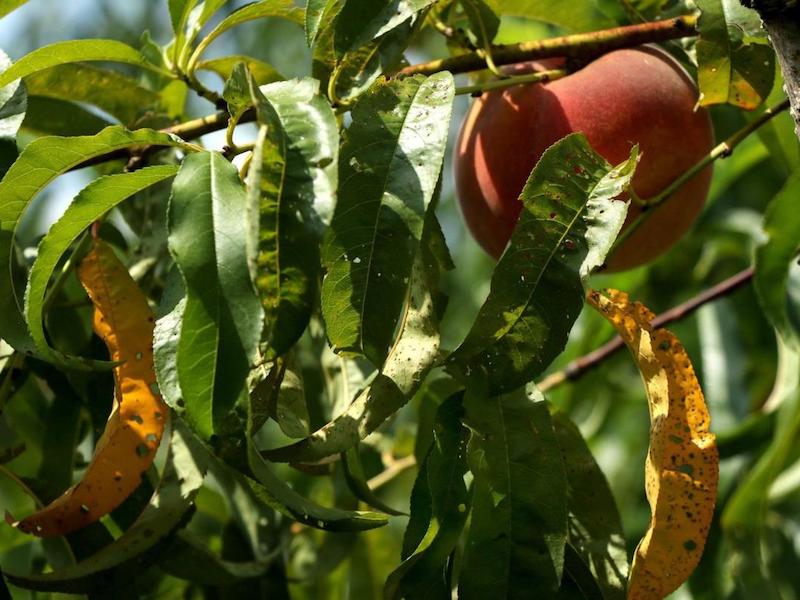
15 Feb Dicamba on trial: Missouri peach farm one witness away from resting its case against Bayer, BASF
Dicamba Lawsuit | The Southern Illinoisan| Jonathan Hettinger | February 8, 2020
—
CAPE GIRARDEAU, Mo. — In July 2016, Bill Bader, frustrated by the second straight year of alleged dicamba damage to his peach trees, got out his invoice book and hand wrote bills to his neighbors he suspected of illegally spraying the herbicide: $720,000 to one, $660,000 to another and $1.2 million to a third, according to testimony in federal court this week.
Bader wrote out the biggest bill — $3.3 million for damages to peaches and the environment — to Monsanto, the St. Louis-based agribusiness company he blamed for the damage from the volatile weed killer.
“I made a mistake, and I was blowing off steam,” Bader testified on Wednesday in the second week of a trial of a lawsuit he filed against German agribusiness giants Bayer, which bought Monsanto in 2018, and BASF. “I was hoping to get their attention.”
Bader Farms, the largest peach producer in Missouri, is seeking $20.9 damages. The case is being considered by a federal jury in the U.S. District Court in Cape Girardeau, Missouri.
Over the past two weeks, lawyers on behalf of Bader Farms have alleged the business has become financially unsustainable in the midst of widespread spraying of dicamba caused by the companies’ release of a new genetically modified cropping system. Bader’s lawsuit is the first to go to trial, though hundreds of other farmers have filed similar cases.
BASF and Monsanto
Bader claims the issues with dicamba moving from nearby fields onto his peach trees started in 2015, with the release of Monsanto’s new genetically modified cotton seeds that could withstand being sprayed by dicamba. The seeds were designed to allow farmers to have more weed killer options for “super weeds” that had developed a resistance to glyphosate, sold under the brand name Roundup.
The company also released soybean seeds resistant to dicamba in 2016. However, farmers had no approved versions of the weed killer to spray. Many farmers illegally applied older versions of dicamba, which drifted off target and damaged crops, including Bader’s, the lawsuit alleges.
The lawsuit alleges the companies knew that farmers would illegally spray. Internal company documents presented during the trial show that officials with BASF and Monsanto were aware that was a risk.
“It sure wasn’t a surprise to me,” said Ford Baldwin, a professor emeritus in weed science from the University of Arkansas and retained expert by Bader Farms. Baldwin has been advising farmers on weed management since 1974.
BASF saw sales of older versions of dicamba increase from $60 million annually in 2014 and 2015 to $100 million in 2016, according to documents presented in the trial.
At least 3.6 million acres of soybeans were suspected to be damaged
The complaints greatly increased in 2017, when Monsanto and BASF released versions designed to be less likely to move off-target than older versions of dicamba. That year, thousands of farmers across the U.S. filed complaints about damage to their crops, according to testimony in the trial. At least 3.6 million acres of soybeans were suspected to be damaged, according to testimony.
Both companies expected thousands of drift complaints, according to testimony. BASF and Monsanto each received more than 3,000 complaints about dicamba in 2017.
Monsanto and BASF deny that their new formulations of dicamba are volatile. Both companies claim that when applied on-label, there is no chance of “adverse effects,” including yield loss, according to testimony presented in the trial.
However, internal documents presented in court show, while BASF officials told farmers that there would be no yield impacts, they told pesticide applicators just the opposite: be careful because you might cause yield loss.
Dicamba buildup
Baldwin testified that the peaches — as well as surrounding oak trees, sycamore trees, kudzu, soybeans and catalpa trees — were hit not by a specific farm, but by the buildup of dicamba in the air from so many farmers spraying the weed killer at the same time. Because of that, Bader wasn’t hit from just one application of dicamba but many, the cause of which is unknown, Baldwin said.
Because of the widespread nature of the dicamba spray, dicamba-resistant soybeans are an “all or nothing” system, Baldwin said. If anyone is spraying dicamba, farmers must either plant Xtend seeds or risk damage.
FREE Consultation | 314-833-4826
Dicamba Drift Lawyers at Peiffer Wolf Carr & Kane are fighting on behalf of farmers and landowners to seek maximum compensation for the damages suffered due to Dicamba. If you suspect that your crops or plants have been damaged by dicamba, contact Peiffer Wolf Carr & Kane by filling out a Contact Form or by calling 314-833-4826 for a FREE Consultation.



